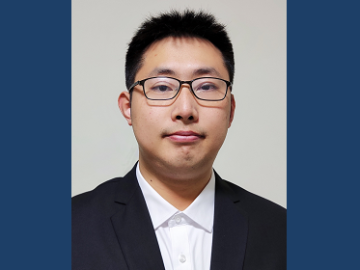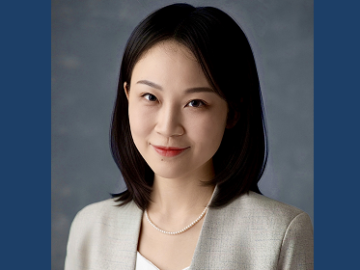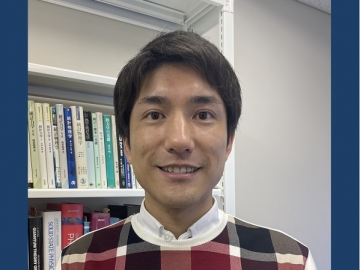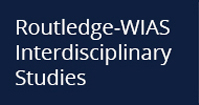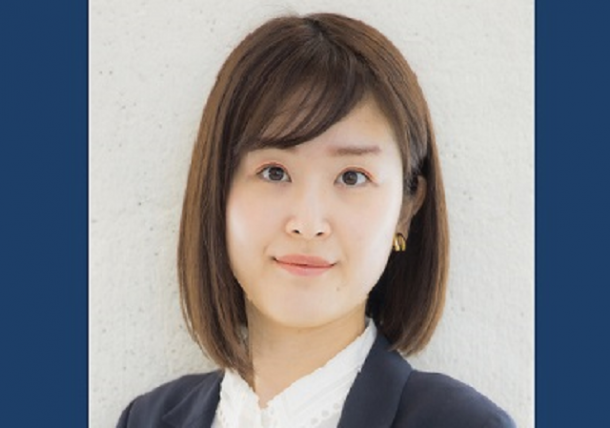
YAMAGUCHI Aya, Assistant Professor (enrolled till March, 2023)
Experiences with my grandparents have led me to my career as a researcher
The focus of my work involves “sociology of law.” This is an area of academic study in which we theoretically examine the phenomena related to laws and society. This includes how laws are actually enforced and how they function in society. It is also based on surveys such as case studies, questionnaires and interviews.
For example, even if you think about inheritance, there are various ways of using and responding to laws in society, such as people who consult with legal experts, those who do not, those who have their will and testament drawn up, and those who do not have a will. Therefore, “sociology of law” investigates possible factors such as economic status, family situation, the complexity of systems and procedures, and the existence of connections with legal experts. It clarifies why such phenomena occur.
I have studied the sociology of law with a focus on access to the judicial system for the elderly. My grandparents had legal problems when I was studying law at an undergraduate level. My grandparents never consulted with a lawyer; my grandfather was ill and his judgment was poor, so it was difficult for them to solve problems on their own. To help, I researched relevant literature on what kind of legal measures to take, but in the process, I wondered if “the current legal system is accessible to the elderly?” Compared to that time, legal support for the elderly has been improving. However, it cannot be denied that there are still elderly people who do not have access to the legal system and are unable to receive legal support. I strive to study every day so that I can make appropriate recommendations for improving the system.
Legal Challenges Facing the Elderly
As of 2022, people aged 65 years and older in Japan accounted for approximately 30% of the total Japanese population. This makes it the highest proportion of elderly people of any society in the world. Along with this, households with a single elderly person also exceeded 7 million in 2019. The number of elderly people suffering from dementia is also thought to be more than 4.6 million in 2012.
In this way the aging of society is advancing and problems related to the law may arise due to deteriorating physical capabilities and judgment and the complexity of family relationships that occur as someone ages. For example, the elderly may suffer from issues such as consumer harm, caregiving, inheritance, and adult guardianship and the like. If the elderly cannot solve these problems on their own, what kind of support can they receive from people around them? I investigated the current situation relating to legal support for the elderly.
Minsei /Jido-iin Connecting the Elderly and a Legal Support Network
Firstly, I implemented a questionnaire survey and an interview survey on what kinds of support are being provided to elderly people by local government Minsei/Jido-iin (hereinafter referred to as Minsei-iin) in the Tokyo metropolitan area. Minsei-iin includes people who offer consultation on the welfare and lifestyle of the elderly, people with disabilities, people who are raising children, and others, in the area where they live, provide information, and connect them to government offices and relevant institutions as needed. People who have been active for many years in local organizations such as neighborhood associations and PTAs and the like are often recommended and commissioned by the Minister of Health, Labour and Welfare. The surveys revealed that Minsei-iin plays two major roles in legal support for the elderly (See Fig. 1).
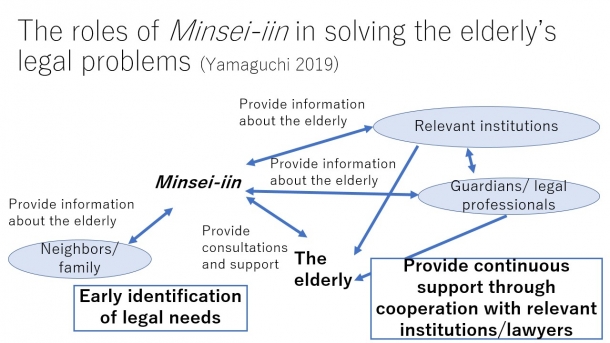
Fig. 1 Diagram Summarizing the Roles of Minsei-iin in Legal Support
Source: Cited Reference 2
The first role is to identify elderly people who have problems and need support at an early stage. This is because Minsei-iin often visits the homes of the elderly for which they are responsible, calls on them and listens to their status, and interacts with their family and neighbors.
The second is appropriately to share the information with the relevant institutions as necessary, connect them to support, and continue to monitor their status thereafter. For example, after an elderly person who is living alone began to use the adult guardianship system, there were instances in which Minsei-iin gave advice on clothing to bring to the nursing care facility in response to inquiries from guardians.
Current Status of the Legal Support Network for the Elderly
In the next stage of the survey, I conducted an interview survey with the Local Authority and the Community General Support Center (CGSC) of one local government in the Tokyo metropolitan area, the Social Welfare Council, the care manager of the in-home care support office, and the staff attorney at the Japan Legal Support Center also known as Houterasu in Japanese (a comprehensive information center for solving legal problems that was setup by the government; the official name is the Japan Legal Support Center) (See Fig. 2).
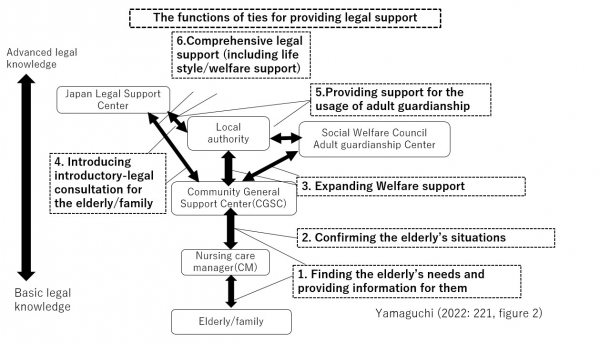
Fig. 2 The higher an institution is located in the above figure, the higher degree of legal expertise it has and at the same time, the scope of support becomes wider, sometimes extending to the entire municipality. This axis only shows the degree of “legal” expertise. For example, nursing care managers are not highly specialized in law, but they are highly specialized in nursing care insurance and are highly connected to the local community. The arrows indicate that the institutions are working collaboratively.
Source: Cited Reference 3
The Community General Support Center (CGSC) serves as a comprehensive counseling contact for the elderly and is positioned as central to the legal support network for the elderly. The Local Authority (the division of the support for the elderly)deals with difficult issues that exceed the Community General Support Center (CGSC). The Social Welfare Council provides support for the use of the adult guardianship system and welfare services. Nursing care managers make care plans or coordinate with service providers to ensure that people in need of care receive appropriate services. Japan Legal Support Center staff attorneys are available to provide legal advice. In this way, the level of legal expertise and the content of support for the elderly varies depending on the institution, but as indicated by the arrows in Fig. 2, this is a mechanism for institutions mutually to cooperate and to enable connections to institutions that provide appropriate support.
From the above two surveys, it was learned that even if the elderly have problems and do not know where to get consultations, there is an established system that guides them to appropriate support if they can connect with someone from Minsei-iin or any of the various administrative and welfare related organization.
Problems and Future Studies
However, there are not a few challenges in the support network. For example, it appears that it is quite difficult for public institutions to respond to the problems of the elderly such as on Saturdays, Sundays, holidays, or early in the morning or late at night. At such a time, it is believed that there are a few instances in which the elderly turn to Minsei-iin who are close to them for help, but it is clear that the burden on Minsei-iin is heavy. Furthermore, when legal professionals such as attorneys are involved in elderly problems, they also need to know about social welfare and social networks. There are communication challenges in multidisciplinary cooperation. As a fundamental problem, the elderly may not be able directly to convey that they are facing problems because of their inability to make sound judgments, or they may reject support because they receive it as an intervention.
It is difficult to offer solutions to these problems immediately, but I believe that possible approaches are to decide on a voluntary guardian in advance before their ability to make sound judgment has declined, to make a will and testament, and to support it, in order to respect the autonomy and dignity of the elderly. Therefore, in the future, I would like to focus on such preparatory actions and implement research therefor.
References
CABINET OFFICE OF JAPAN, HEISEI 29 NEN BAN KōREI SYAKAI HAKUSYO [ANNUAL REPORT ON THE AGEING SOCIETY: 2017].
CABINET OFFICE OF JAPAN, REIWA 4 NEN BAN KōREI SYAKAI HAKUSYO [ANNUAL REPORT ON THE AGEING SOCIETY: 2022].
Yamaguchi A. (2019) Kōreisya no Hōteki Shien niokeru Minsei-iin no Kinō ni Kansuru Kenkyū (The Role of Minsei-iin in Solving the Elderly’s Legal Problems: A Mixed Methods Approach), Hōsyakai-gaku (Journal of Japanese Law and Society Association), 85, 209-241.
Aya Yamaguchi, Kōreisha eno Hōteki Shien ni Muketa Chīki no Shien Nettiowāku no Jittai to Kinō ni Kansuru Jirei Bunseki [Legal Support Network for Elderly People in a Local Community: A Case Study of the City in Tokyo], 105 Rikkyō Hōgaku 208, 231(2022).
Coverage/Constitution: AIMONO Keiko
Cooperation: Graduate School of Political Science, Waseda University, J-School

